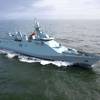From Commander, U.S. Pacific Fleet Public Affairs
The Navy's Scientific Operational Naval Acoustic Research Conference was held February 6-7 to provide an opportunity for the Navy's scientists, fleet operators, and environmental specialists to share information regarding recent advances in science, mission requirements, and communication needs.
About 100 people attended the two-day conference, which was chaired by OPNAV N45, the Navy's environmental readiness command, and hosted by Adm. Robert F. Willard, Commander, U.S. Pacific Fleet.
The conference ended with agreement to hold future gatherings to discuss issues ranging from the direction of future research to procedural improvements.
While great progress has been made in recent years, many of the speakers noted that much remains to be learned about how sound behaves underwater and how it affects marine mammals. "We know more about outer space than we do about inner space," said one speaker.
For example, Dr. Jim Finneran of the Navy Marine Mammal Program said hearing thresholds have been determined for 25 species of marine mammals through painstaking research. Hearing thresholds for the more than 100 other marine mammal species, including all of the large, baleen whales, have not yet been determined.
The work done by Finneran and his colleagues is part of the Navy's $18 million-a-year marine mammal research budget.
Willard noted, "We are making a significant investment in the science."
He said lawsuits "with no scientific basis whatsoever are costing the Navy operational flexibility."
Several private organizations have sued the Navy in recent years, alleging that marine mammals are harmed by mid-frequency active sonar - the Navy's primary method of detecting extremely quiet diesel-electric submarines. Several conference participants noted there is no evidence to support many of those allegations.
In a highly publicized March 2000 case in the Bahamas, 16 small whales beached themselves after they were exposed to sonar from a group of foreign and U.S. warships. Six of the whales died.
An investigation of the Bahamas strandings attributed them to sonar used in combination with certain specific physical and oceanographic conditions - including a narrow underwater canyon with no egress, for example. The Navy has since adopted measures to avoid using sonar in such conditions, and Navy sonar has not been scientifically linked to any marine mammal deaths since that case.
Adm. Willard said, "With a strong scientific foundation, we hope to be able to continue the sonar training that's so vital to protecting our Sailors at sea and become even better at preventing harm to marine mammals.
Speakers at the conference noted that sonar has been linked scientifically to a few dozen marine mammal deaths worldwide over the past 12 years, while the commercial fishing industry killed millions of marine mammals worldwide over the same period.
Willard said the U.S. Navy has emerged as a worldwide leader in environmental care and self-discipline, with pioneering programs for disposal of plastics, hazardous waste and other pollutants from ships at sea.
Sponsored Content
Innovative Hull Maintenance: Profitable & Green

December 2024
 Read the Magazine
Read the Magazine

 Read the Magazine
Read the Magazine
This issue sponsored by:

Propulsion Choices begin with Fuel and End with Politics
Subscribe for
Maritime Reporter E-News
Maritime Reporter E-News is the maritime industry's largest circulation and most authoritative ENews Service, delivered to your Email five times per week










